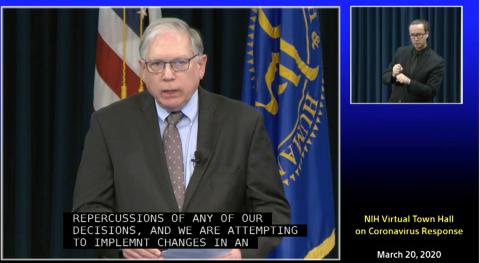Remote Success Story: A Record-Breaking Town Hall

For many NIH employees, the novel coronavirus disease—COVID-19—has affected the ways we work: events have shifted to a virtual space or been postponed, many employees are teleworking and all of us are adapting to a new, remote environment.
This can be especially complex at NIH, where operations are mostly conducted in person. However, the Center for Information Technology is equipped to handle many remote collaboration needs. CIT provides remote expertise and virtual meeting solutions, allowing staff the resources to continue to focus on their core missions without interruption.
That’s why NIH director Dr. Francis Collins and his team reached out for assistance in holding an NIH-wide virtual town hall on Mar. 20 to address the coronavirus pandemic. Holding such a large-scale, virtual meeting while on a tight timeline (just a week) was a massive operation, one that required the dedication and swift work of many staff around the clock.
Over the course of a week, CIT gathered requirements and tested a new, modernized video-streaming service that leverages the power of secure cloud infrastructure. This service was able to support attendance from more than 40,000 NIH staff members and still provided a seamless experience for all.

The virtual town hall was a success. It was the largest virtual event ever held at NIH—more than 23,000 staff tuned in and more than 1,900 questions were submitted. In fact, more than 10,000 staff successfully connected into the town hall 10 minutes prior to the start time.
What made the efforts work so smoothly was the collaboration of different NIH teams and colleagues including (but not limited to) the National Cancer Institute, the NIH Events Management team and NIH’s Office of Communications and Public Liaison.
COVID-19 is changing the model of where and how our meetings take place. To compare, during the week of Mar. 9, which was before most staff began teleworking, there were about 11,500 meetings with a virtual meeting option included. In the first 2 weeks since Collins issued guidance encouraging those who are telework-eligible to begin working remotely, the NIH community had held a total of 60,212 virtual meetings with almost 278,000 participants.
On Mar. 18, NIH staff held more Webex meetings in a single day (3,888) than in the entire month of March 2019 (3,855).
In addition, there are now more than 30,000 VPN accounts resulting in a 279 percent increase in VPN usage; NIH Skype for Business meetings have increased by 196 percent; Webex meetings have increased by 135 percent; and NIH IT Service Desk support has increased by 65 percent.
There have also been improvements to allow NIH staff to work more effectively while remote. All NIH staff can now use Office 365 tools (including Outlook, SharePoint Online, Teams and OneDrive) without needing to connect to VPN. In addition, CIT is hosting training sessions on virtual meeting tools to help NIH staff work and collaborate more effectively with their teams. In the first 7 trainings alone, there were approximately 4,300 participants.
To learn more about virtual meeting options available to NIH staff, visit the virtual meetings section of the NIH Guidance for Staff on Coronavirus intranet page.
On this page, you will also find information on tools, tips, and best practices for remote work, including NIH email, VPN, file storage and collaboration tools, mobile devices and more.
